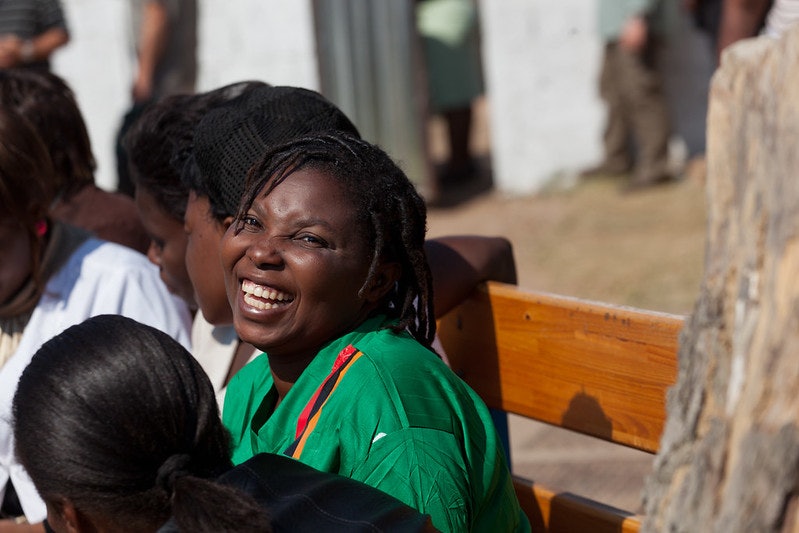"Many people escape from North Korea because of hunger and the living conditions. However, my reason was that I was still very young and I wanted to see what was out in the real world."
To help North Korean escapees pursue higher education and build productive, prosperous lives as new Americans, the Bush Institute awarded eight recipients the North Korea Freedom Scholarship. The scholarship will support escapees pursuing a range of educational opportunities at a variety of post-secondary institutions, including traditional four-year university programs, community colleges, and trade and vocational schools.
Below is the story of one of the recipients, L.K. L.K. has requested to remain anonymous, as leaving North Korea without permission is a crime, and violators and their immediate relatives may face imprisonment or punishment. The interview was conducted by Bush Institute Human Freedom Intern Jeff Kim.
How and why did you escape North Korea?
My reason to escape from North Korea was different from many others. Many people escape from North Korea because of hunger and the living conditions. However, my reason was that I was still very young and I wanted to see what was out in the real world. I had a close friend from China who studied abroad in the U.S and he would tell me all the stories and experiences he had during his studies. So, after hearing his stories, I gathered up all my courage and escaped, I wanted to personally see the real world that was hidden from us.
Resources:
Escaping North Korea and Finding Freedom
North Korean Escapee Pursues Theology Degree
Improving the Human Condition in North Korea. Defining a New Path Forward.
Human Rights Still a Missing Piece of the North Korea Puzzle
You were born in an era better known as the “March of Hardship.” What was your childhood like at that time, and did you see any changes in everyday life after the famine?
I think the hardest time was between 1994 and 1995. I was age 5 at that time so I vaguely remember things that happened. But, I still remember my parents telling me that many people died every day from the famine and most people were left with nothing. However, we were able to see changes in North Korea afterwards not necessarily the situation itself, but the lifestyle of North Koreans started to change. Before, most North Koreans relied on the Government for support, but after the famine more and more North Koreans started to support themselves. Instead of waiting on the Government to act, people started to act on their own.
Why did you decide to come to the United States rather than go to South Korea?
My initial decision was to go to South Korea, but when I moved to Thailand I was given a different option, which was to move to America. There is a North Korean community in South Korea that would make adjusting to a new life easier, but I didn’t want that help and wanted to branch out on my own. I wanted to be in a place where I knew I would have a better chance of developing myself.
Were you able to receive an education in North Korea?
Yes, I was able to attend just elementary school. However, after the famine both my parents were laid off from their positions and I remember I had to quit school to help my parents support our family.
Why is getting an education important to you?
We live in a different world now and it’s very competitive everywhere we go. So, as a person who’s living in this world I believe we need to learn to adopt and we should never stop learning. I don’t see education as a source or a tool to get that ideal job, but I see education as a source for self-improvement. Finding out my weakness and strengthen it with education, overall education is needed because we need to learn to improve everyday life.
What are your long-term ambitions or goals?
Currently, I am studying general education and planning to study either computer science or mechanical engineering.
What was the biggest challenge you faced trying to adjust to daily life here in the U.S?
I think the hardest thing for me at that time was, other than the language barrier, not being able to see or even talk to my family ever again and the scare of being deported back to North Korea. Physically, I was able to adjust well, but mentally it was one of the hardest times.
The situation in North Korea appears so desperate. Are there things that ordinary people can do for the people of North Korea? Are there things you hope to do to improve the situation there?
I honestly believe it’s hard for everyday people to help North Korea. However, I think the first step is to educate people. We need to educate the people on what is truly going on in North Korea today and its history. Instead of having a generalized ideal of what North Korea is and what is going on in North Korea. I believe in order to really help North Korea we must educate others to the truth that only people like me can tell. So I think it’s important for others like me to come out and tell their story and educate others about what is truly happening in North Korea and what we can do to help.
What is your day-to-day life like and what do you do for fun?
I work every day and go to school. I like to travel whenever I get the chance, I just recently visited Yellowstone with few friends and it was an amazing experience. I also love painting and enjoy reading books on entrepreneurs.
Jeff Kim is a Human Freedom Initiative intern at the Bush Institute.































